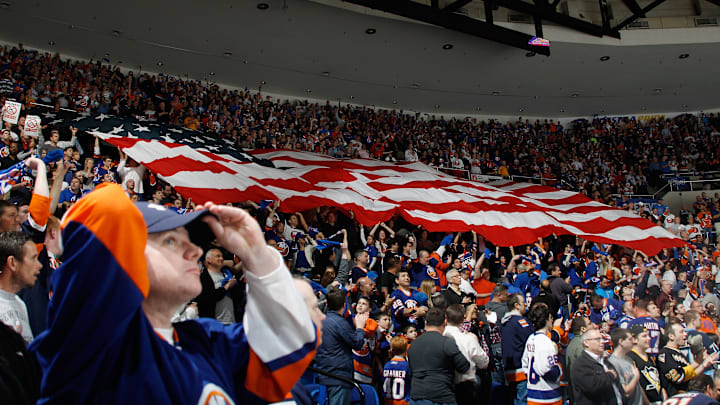Twenty-one years ago, the New York Islanders learned about the tragic events of September 11th in Lake Placid, NY, the site of the most significant moment in American hockey history, which happened 21 years earlier at the 1980 Winter Olympics.
The day was always going to be of historical significance for their 37-year-old U.S. born head-coach Peter Laviolette. "I was probably two minutes into my first training camp as a head coach in the National Hockey League," he said. "Day 1. I'll never forget."
Never Forget: The part the NY Islanders played after 9/11
There was excitement surrounding the Islanders organization for the first time in years following the trades for Adrian Aucoin, Alexei Yashin, and Michael Peca. There was a semblance of expectations for a much-improved roster. But like everything else, all of that faded to the background as the day unfolded and the extent of the devastation and tragedy was realized.
"I might have heard first from the players, but shortly after that, five after nine or seven after nine, (General Manager) Mike Milbury came over and told me what had happened," Laviolette said. "Nobody was sure at that point. We didn't really know."
"After practice, new Islanders Head Coach Peter Laviolette wasn’t in any mood to talk hockey. I remember the angry look on his face, a feeling that all Americans were feeling that day. To their credit, Yashin, Peca and some of the other players talked to reporters so that there were quotes for any stories that they may have been able to file given the circumstances. There were monitors in the arena showing the news coverage, so hockey wasn’t close to be an important subject to anyone."Peter Schwartz, NY Sportsday
Sports played a role in helping the country heal in the days, weeks, and months that followed. Mike Piazza's home run vs. the Braves, the Yankees' trip to the World Series, and Mark Messier wearing the helmet of a fallen fire chief were all produced moments and images that aided the healing process. The Islanders did the same for their fans.
The 2001-02 Islanders started the season with four straight wins and went 9-0-1 in the first 10 games leading to the team's first playoff berth in seven seasons. On October 13, 2001, the Islanders had their opportunity to pay tribute to the victims of 9/11 and support the extended-Long Island community with the first regular season game at the Nassau Coliseum since the attacks.
Fans were on their feet for nearly an hour, from the start of warmups and through the pre-game ceremony. Ring-announcer Michael Buffer was on-hand to introduce the team, and the FDNY and NYPD hockey teams took the ice and unrolled the American flag along with the Islanders and Detroit Red Wings as actress Jamie-Lynn Sigler sang the national anthem. After the fans sat down, Oleg Kvasha scored 36 seconds into the game to send the Coliseum crowd into a frenzy and get them back on their feet.
This was a huge honor in my life, and I will never forget the overwhelming feeling of love and pride in the coliseum. https://t.co/lY1b4tQV24
— Jamie-Lynn Sigler (@JamieLSigler) September 10, 2021
Among the Islanders fans most deeply impacted by 9/11 was Ray Pfeifer, a firefighter and first-responder. The Hicksville resident spent years after 9/11 advocating the guarantee of health benefits for first responders as he battled cancer, becoming an activist for the Zagroda Act.
On April 2, 2016, the Islanders honored him at Barclays Center as he took center ice for the ceremonial puck-drop before the game between the Isles and Pittsburgh Penguins. “There’s nobody who’s going to be more happy than me,” Pfeifer had said before dropping the puck. “To be in that venue, just to be in front of a hometown crowd and be with my team . . . it’s a dream come true. Not everybody gets to do it. I’m a longtime fan, and it’s an honor just to go out there and hang out with these guys.”
The Islanders send their deepest condolences to the family & friends of retired FDNY firefighter Ray Pfeifer, who passed away last weekend. pic.twitter.com/S8uHvJ3li0
— New York Islanders (@NYIslanders) June 2, 2017
Pfeifer passed away on May 27, 2017, after a courageous battle with cancer and tireless fight representing first responders. In the months before his passing, Pfeifer fought to ensure that those that died of 9/11-related illnesses had a place on FDNY’s main Wall of Honor. The Ray Pfeifer Foundation raises money and donations for all 9/11 responders in need of medical equipment which is not covered by their insurance.
